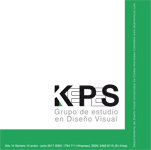Autores
Resumo
Este artículo analiza la historia y la actualidad de la pequeña maquinaria de punto, su relación con la programación y las posibilidades de creación de motivos Jacquard. Se analiza cómo en los últimos años se ha revitalizado el uso de estas máquinas auspiciado por las relaciones colaborativas de usuarios en red y el interés por las producciones sostenibles, personalizables y de corta tirada. Por último, se propone un modelo para el diseño de patrones modulares para tarjetas perforadas apoyado en herramientas informáticas.
Referências
Arnheim, R. & Fernández-Campoamor, M.L.B. (2002). Arte y percepción visual: Psicología del ojo creador. Madrid: Alianza editorial.
Au, K.F. (2011). Advances in knitting technology. Cambridge: Elsevier.
AYAB, V. All yarns are beautiful. (2016). Recuperado de: http://www.ayabknitting.com/supported-devices/.
Bloy, M. The luddites 1811-1816. (2016). Recuperado de: http://www.victorianweb.org/history/riots/luddites.html.
Canet, M. & Guljajeva, V. (2016). Canet, Guljajeva. Recuperado de: http://www.varvarag.info/.
Circular Knitic. (2016). Recuperado de: http://www.varvarag.info/circular-knitic/.
Castellanos Valderrama, J.G. (2015). Programación del futuro inteligencia artificial. Aplicatec, 5(2)
Conklin, S. (2016). Conklin S. Webpage. Recuperado de: http://ai4qr.com/.
De Fusco, R. & Izquierdo, M. (2005). Historia del diseño. Santa & Cole.
El-Zanfaly, D. (2015). [I 3] imitation, iteration and improvisation: Embodied interaction in making and learning. Design Studies, 41, 79-109.
Espinosa, M. (2000). Introducción a los procesos de fabricación. Madrid: UNED Ed.
Fab Foundation. (2016). The Fab Foundation Webpage. Recuperado de: http://www.fabfoundation.org
GitHub. (2016). Github. Recuperado de: https://github.com/open-source.
González, A.S. (2014). La inteligencia artificial a través de sus científicos. Encuentros Multidisciplinares, 16 (47), 70-80.
Guljajeva, V. & Sola, M.C. (2012) The development and role of personal manufacturing. Case study: Open knitting. Design Debates
Gürsoy, B. & Özkar, M. (2015). Visualizing making: Shapes, materials, and actions. Design Studies, 41, 29-50.
Hallett, C. & Johnston, A. (2010). Telas para moda: Guía de fibras naturales Barcelona: Blume.
Harrison, L., Earl, C. & Eckert, C. (2015). Exploratory making: Shape, structure and motion. Design Studies, 41, 51-78.
Hogerhuis, J.R. (2016). KM Internals. Recuperado de: https://groups.yahoo.com/neo/groups/kminternals/info.
Joseph, F. & Heslop, P. (2014). Enabling design and business innovation through new textile technologies.
KnitPro MicroRevolt. (2016). MicroRevolt Webpage. Recuperado de: http://www.microrevolt.org/knitPro/.
Ledbetter, K. (2012). Victorian needlework. ABC-CLIO. Oxford: Praeger
Maker movement. (2016). Maker Movement. Recuperado de: http://makerfaire.com/maker-movement/.
MicroRevolt. (2016). MicroRevolt information Webpage. Recuperado de: http://www.microrevolt.org/events.htm.
OKnitMe (2016). Serpica Naro. OKnitMe Webpage. Recuperado de: http://oknitme.serpicanaro.org/.
Opensource, VVAA. (2016). Opensource. Recuperado de: https://opensource.org/about.
Post, D. (2016). Davi Post Knitting works. Recuperado de: http://daviworks.com/knitting/.
Rubio, G. (2016). Rubio, G. Openknit. Recuperado de: http://openknit.org/.
Serriere, F. (2016). KnitYak. Available: https://www.kickstarter.com/projects/fbz/knityak-custom-mathematical-knit-scarves/description.
Sissons, J. (2010). Basics fashion design 06: Knitwear. Lausanne: Ava Publishing.
Soft Byte (2016). Designaknit. Recuperado de: https://www.softbyte.co.uk/designaknit.htm.
Soler, M.C. (2007). Manual de tejidos. Barcelona: Ed.Wuds World
Spencer, D.J. (2001). Knitting technology: A comprehensive handbook and practical guide. Oxford: Pergamon Press.
Stam, C., Van der Velden, N., Rubio, G. & Verlinden, J. (2014). Redefining the role of designers within an urban community using digital design and localized manufacturing of wearables. ICAT 2014: Proceedings of the 5th International Conference on Additive Technologies, Vienna, Austria, 16-17 October 2014.
Stern, B. Phyton Electro-knit. (2016). Stern, B. Electro-knit. Recuperado de: https://github.com/adafruit/knitting_machine.
Stern, B. (2016). Becky Stern video. Available: (https://www.youtube.com/watch?v=GhnTSWMMtdU.
Stern, B. (2016). Phyton Electro-knit. Available: https://learn.adafruit.com/electroknit.
The cutting class. Fully fashioned vs. cut and sew. (2016). Fully fashioned vs. Cut and sew. Available: http://thecuttingclass.com/post/3563227104/knitwearjil-sander.
The Library of Congress. American Memory. (2016). Plate, punch card, and instructions for Herman Hollerith's Electric Sorting and Tabulating
Machine, ca. 1895. (Herman Hollerith Papers). Available: http://memory.loc.gov/cgi-bin/ampage?collId=mcc&fileName=023/page.db&recNum=0&itemLink=r?ammem/mcc:@field(DOCID+@lit(mcc/023)).
USPTO. United States Patent and Trade Mark Office. Griswold, H.J. (1892) U.S. Patent No.US472,874. Recuperado de: https://www.google.com/patents/US472874.
USPTO. United States Patent and Trade Mark Office. Luchsinger, E. (1954) U.S. Patent No.US2837903 A. Recuperado de: https://www.google.ch/patents/US2837903
V.V.A.A.Stitchboard webpage. (2016). Stitchboard Webpage. Free Pattern Wizard. Available: http://stitchboard.com/pages/pattern/freePatternWizard.php.
Vallet, F., Eynard, B., Millet, D., Mahut, S.G., Tyl, B. & Bertoluci, G. (2013). Using eco-design tools: An overview of experts' practices. Design Studies, 34(3), 345-377.
VVAA. Cellular automaton. (2016). Cellular Automaton. Available: http://uncomp.uwe.ac.uk/genaro/home.html.

 pdf (Español (España))
pdf (Español (España))
 FLIP
FLIP






















